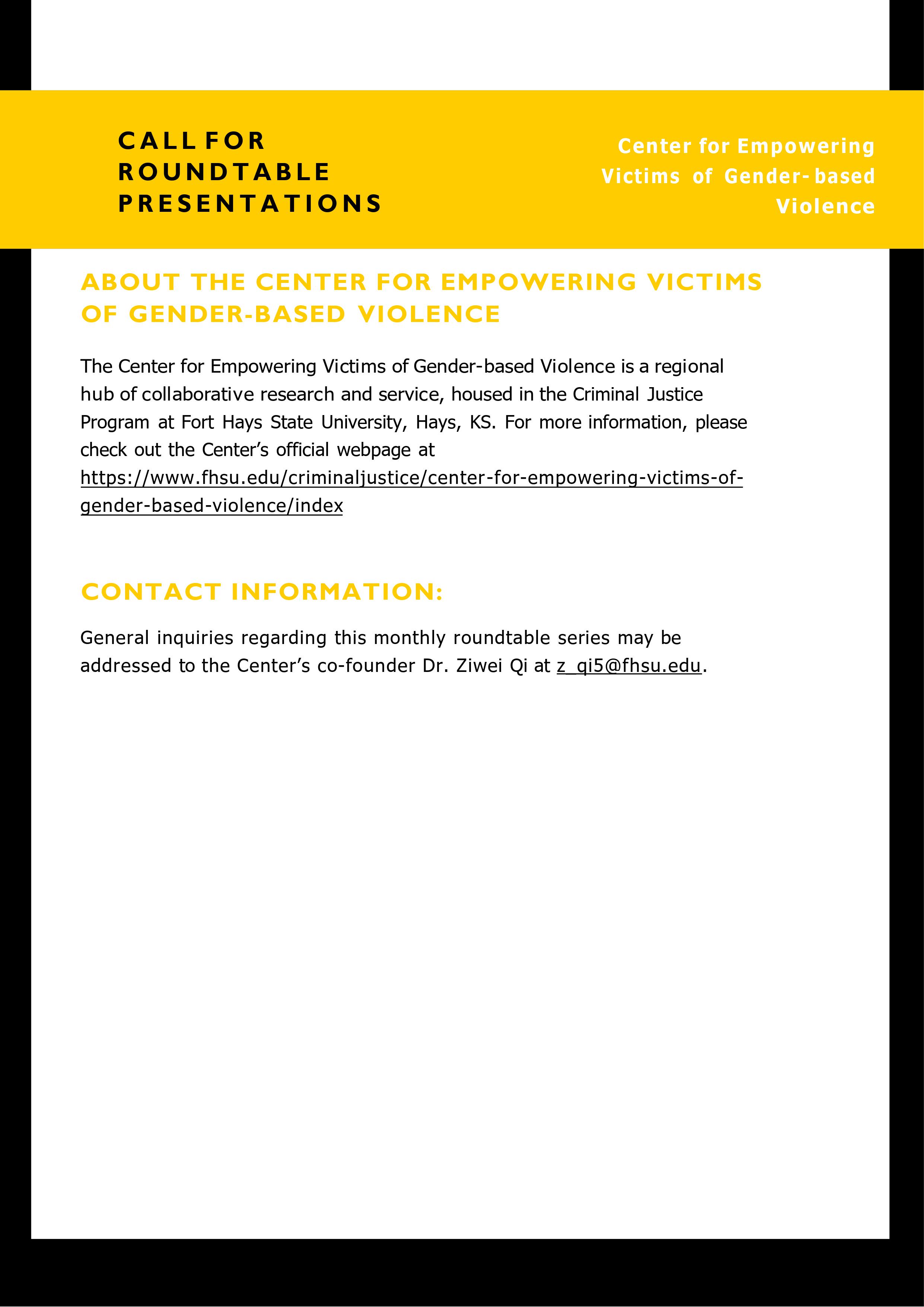Center for Empowering Victims of Gender-based Violence (CEVGV)
The Center for Empowering Victims of Gender-based Violence (CEVGV) is a regional hub of collaborative research and service, housed in Criminal Justice Programs at Fort Hays State University.


Economic Justice and Advocacy Certificate
Funded by the Innovation and Entrepreneurship grant sponsored by President Tisa Mason, the program offers scholarships for completing the certificate, comprising 10 credit hours of coursework. Students will acquire a foundational knowledge of victim advocacy and develop strong written communication skills through the following courses:
- CRJ 100 Workshop in Criminal Justice: Economic Justice and Advocacy (1 credit)
- CRJ 367 Victim Advocacy (3 credits)
- BCOM 210 Intro to Professional Development (3 credits)
- SOC 664 Social Entrepreneurship and Grassroots Social Action (3 credits) OR SOC 680 Nonprofit Organizations (3 credits)
A special 1-credit hour course within the certificate focuses on developing a workshop or project to be shared with students, faculty, staff, and the community, raising awareness about GBV and enhancing the well-being of rural communities.
The FHSU Innovation grant also provides financial support and resources to community members who aspire to create sustainable solutions and services that will contribute to the economic empowerment of GBV survivors. Financial assistance of $700 per person supports tuition, fees, and skills development. Application forms for scholarships can be found here.
This program aims to foster a more inclusive workplace environment and empower professionals to advocate for GBV survivors, driving positive change and reducing these individuals' constraints.
For more information about the Economic Justice and Advocacy Certificate program, please contact Dr. Rachel Dolechek at rldolechek@fhsu.edu and Dr.Ziwei Qi at z_qi5@fhsu.edu
About
- The Center for Empowering Victims of Gender-based Violence aims to reduce the constraints facing survivors, to promote the freedom of economic independence, and to empower survivors to seize opportunity freely. The center commits to providing sustainable support and improvement to help survivors to break the cycle of violence and transform themselves from victims/survivors to social entrepreneurs.
- The Center facilitates cross-disciplinary research focusing on the causes and control of gender-based violence in rural areas.
- The Center leads and facilitates collaborative networks for researchers to apply evidence-based approaches and to investigate best practices addressing gender-based violence in rural communities.
- The Center establishes and develops academic-community collaborations through service-learning, research, assessment, and to create educational opportunities and policy recommendations that enhance the wellbeing of rural communities.
- For questions, please email the Center at centerforempowerment@fhsu.edu
History of the Center
In 2018, Dr. Ziwei Qi of Criminal Justice and Dr. Hsin-Yen Yang of Communication Studies were selected as entrepreneurship faculty fellows by the Robins College of Business and Entrepreneurship and the Provost's Office at Fort Hays State University. This fellowship supports Drs. Qi and Yang to pursue their innovative approaches to empowering survivors of gender-based violence from rural communities to gain economic independence and long-term security. Their initiative addressed the importance of social entrepreneurship, safe housing, employment, counseling, and healthcare for survivors' financial freedom and social justice.
With the support from Criminal Justice Programs, Communication Studies, Sociology, and Art and Design, in March 2020, the Center for Empowering Victims of Gender-based Violence (CEVGV) was established and housed in Criminal Justice Programs. Dr. Tamara Lynn, chair of Criminal Justice Programs, became the Center's third co-founder alongside Drs. Yang and Qi.
Currently, the Center has welcomed four senior research consultants: Dr. Christy Craig of Sociology and Drs. Morgan Steele and April Terry of Criminal Justice, and Dr. Rachel Dolechek of Applied Business Studies, to provide research and policy recommendations on gender-based violence in the rural community. The Center also has two undergraduate research assistants, Brandi Hanson and Cristina Jimenez, and one graduate research assistant, Viviana Lizarraga.
Why Rural Justice Matters?
“Many scholars have bypassed rural locations, producing an urban ethnocentrism in criminology. Specifically, few have considered the spatial positioning of girls and women in rural communities and how unique rural cultural dynamics influence the acknowledgement and response towards gender-based violence. Rural communities are characterized by anonymity and privacy from others due to “close-knit” ties and a mentality where individuals informally work out interpersonal agreements. Reputations are at stake in rural communities—places where family name, socioeconomic status, gender identification, race/ethnicity, and other variables, play a clear role in how communities respond to one another, especially during instances of gender-based violence. With diminished service availability, geographic isolation, and blurred boundaries for professionals, better understanding of intersectionality and service responses in rural areas is necessary and timely.”
“Rural crimes are undergoing fundamental and drastic changes across the world due to migration, the decline of the family farm, the emergence of violence, the impact of the opioid crisis, the challenges of housing development, and limited access to various social and legal resources. Considering the scarcity of literature on rural crime and rural criminology, it’s criminologists’ responsibility to reimagine the causes and consequences of crimes in rural areas.”
The Center for Empowering Victims of Gender-based Violence (CEVGV) brings together an interdisciplinary team of scholars and students representing multiple colleges across campus. CEVGV engages in interdisciplinary collaboration, scholarly networks, and civic engagement with local communities that embody an academic commitment to sharing knowledge, supporting long-term collaborations through research and experiential learning, creating programming, sharing teaching, and responding to gender-based violence in Kansas.
Mission
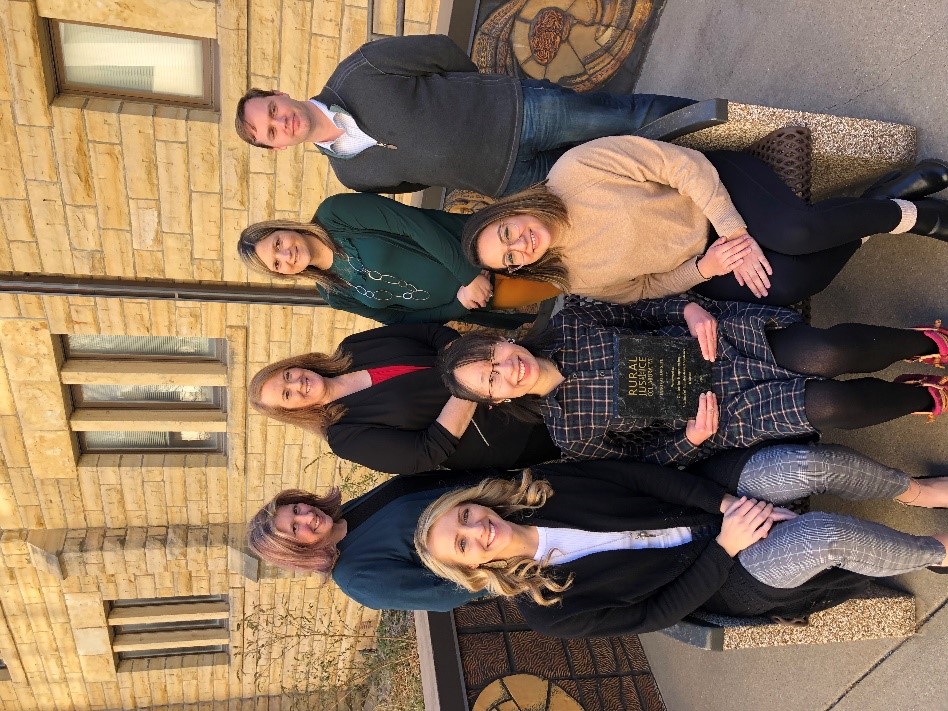
CEVGV's missions are:
- To reduce the constraints that survivors face, promote the freedom of economic independence, and empower survivors to seize opportunities freely.
- To provide sustainable support to help survivors to break the cycle of violence and transform themselves from victims/survivors to social entrepreneurs.
- To facilitate cross-disciplinary research focusing on the causes of gender-based violence in rural areas.
- To initiate collaborative networks for researchers to apply evidence-based approaches and investigate best practices for addressing gender-based violence in rural communities.
- To establish and develop academic-community collaborations through service learning, research, and assessment to create educational opportunities and policy recommendations that enhance the well-being of rural communities.
Staff
Dr. Ziwei Qi

Founder and Student Research Coordinator
Dr. Ziwei Qi is an Associate Professor in Criminal Justice Programs at Fort Hays State University. Her research incorporates social entrepreneurship and political advocacy elements to inform progressive policies emphasizing economic empowerment through education and technology. In recent years, she has been working with other researchers to establish and develop academic-community collaborations through service learning, research, and assessment and to create educational opportunities and policy recommendations to enhance the well-being of rural communities.
Dr. Hsin-Yen Yang

Founder
Dr. Hsin-Yen Yang is a Professor in Communication Studies Programs at Fort Hays State University. She holds a PhD in Communication Studies from the University of Iowa, a nationally recognized doctoral program; a Master's degree in Integrated Marketing Communication from Emerson College in Boston; a BA in Political Science from National Taiwan University. Dr. Yang has advised many award-winning PR campaigns in state- and nation-wide collegiate contests. She was nominated for the Pilot Award, which recognizes an outstanding faculty member at FHSU in 2013, 2014, 2017, 2018 and 2019. Dr. Yang was selected as an Entrepreneurship Faculty Fellow in 2018. She serves on the Title IX Advisory Committee at FHSU, and she is the faculty advisor of the FHSU Chapter of the Public Relations Student Society of America (PRSSA)
Dr. Tamara J. Lynn

Founder
Dr. Tamara J. Lynn is Chair and Associate Professor in Criminal Justice Programs at Fort Hays State University. Current research includes recruiting, hiring, and retaining law enforcement in rural communities and effects of stress on law enforcement officers. Dr. Lynn also serves as Executive Council President of the National De-escalation Training Center and Director of the regional training center on the FHSU campus, for which she has secured $2.75 million in federal funding to train law enforcement in advanced de-escalation tactics. Dr. Lynn holds a PhD in Sociology, with concentrations in Criminology and Political Sociology, from Kansas State University and a Master of Liberal Studies, with concentrations in Public Administration and Criminal Justice, from Fort Hays State University.
Dr. April Terry

Research Consultant
Dr. April N.Terry is an Associate Professor in Criminal Justice Programs at Fort Hays State University, specializing in four lines of research: juvenile corrections, gender and crime, rural criminology, and gender-based violence. Dr. Terry obtained a Bachelor of Arts degree in Psychology and Criminal Justice, a Master of Arts degree in Clinical Psychology, and a PhD in Sociology (concentration in Criminology and Gender Studies). Since 2018, Dr. Terry has helped secure more than $550,000 for initiatives surrounding justice issues, published several dozen manuscripts and book chapters advocating for survivors as well as system-involved individuals, and has more than 100 local, regional, or national presentations on prevention and intervention efforts.
Dr. Morgan Steele

Research Consultant
Dr. Morgan Steele is an Assistant Professor in Criminal Justice Programs at Fort Hays State University. His research focuses on quantitative methodology, community crime patterns, and the use of forensic evidence within the criminal justice system. Dr. Steele serves as the National Research Coordinator for National De-escalation Training Center (NDTC) where he coordinates and facilitates research across the national network of regional training centers. He was also instrumental in securing $2.75 million in federal funding to support NDTC. He received his PhD in Criminal Justice from the University of Cincinnati with a focus on policing and criminology. He is proficient in the following: survey development, content analysis, experimental design, exploratory factor analysis, longitudinal analysis, multilevel modeling, and program assessment.
Dr. Christy Craig

Research Consultant
Dr. Christy Craig is an Assistant Professor of Sociology at Fort Hays State University. She studied anthropology, sociology, and women's and gender studies, earning her PhD in Sociology from the University of Kansas. Dr. Craig's research focuses on gender, sexuality, and culture in Ireland and the United States, trauma and identity, as well as accessibility and inclusivity in higher education.
Dr. Rachel Dolechek

Research Consultant, Community Outreach and Communication Coordinator
Dr. Rachel Dolechek is a member of the Department of Applied Business Studies at Fort Hays State University. Dr. Dolechek obtained a Bachelor of Business Administration (BBA) in Business Communication, a Master of Business Administration (MBA) with a concentration in Finance, an Educational Specialist (Ed.S.), and a Doctor of Business Administration (DBA). She has worked on a variety of multidisciplinary research projects and has an interest in continuing research focused on employability.
Annalise Loucks

Undergraduate Research Assistant
Annalise Loucks is a student at Fort Hays State University studying criminal justice. She plans to pursue a graduate degree in criminology and criminal justice to one day achieve her dream of doing crime scene investigation. Annalise has been very passionate about victim advocacy. She is currently working with the Center on research regarding Title IX, its related policy implications, and campus victim advocacy. Annalise does not want victims to be afraid to speak up, even though it is one of the hardest things a person can do. Annalise was born and raised in Salina, Kansas, where she plans to start her career after school until she can work her way up to a bigger city.
Suzanna Schneider

Undergraduate Research Assistant
Suzanna Schneider is a student at Fort Hays State University pursuing a degree in Criminal Justice. Suzanna is passionate about empowering victims of gender-based violence and aspires to become a survivor-centered victim advocate. Her academic journey has encompassed diverse courses, including but not limited to women and crime, victim advocacy, and gender, race, and inequality studies. With a steadfast determination, she envisions herself pursuing a law degree and a career as a legal professional in prosecuting domestic cases or providing support to survivors. Suzanna's engagement extends beyond the classroom, actively contributing to campus life through her participation with Catholic Tigers and embodying the spirit of an engaged campus citizen.
Tasanya Rowe
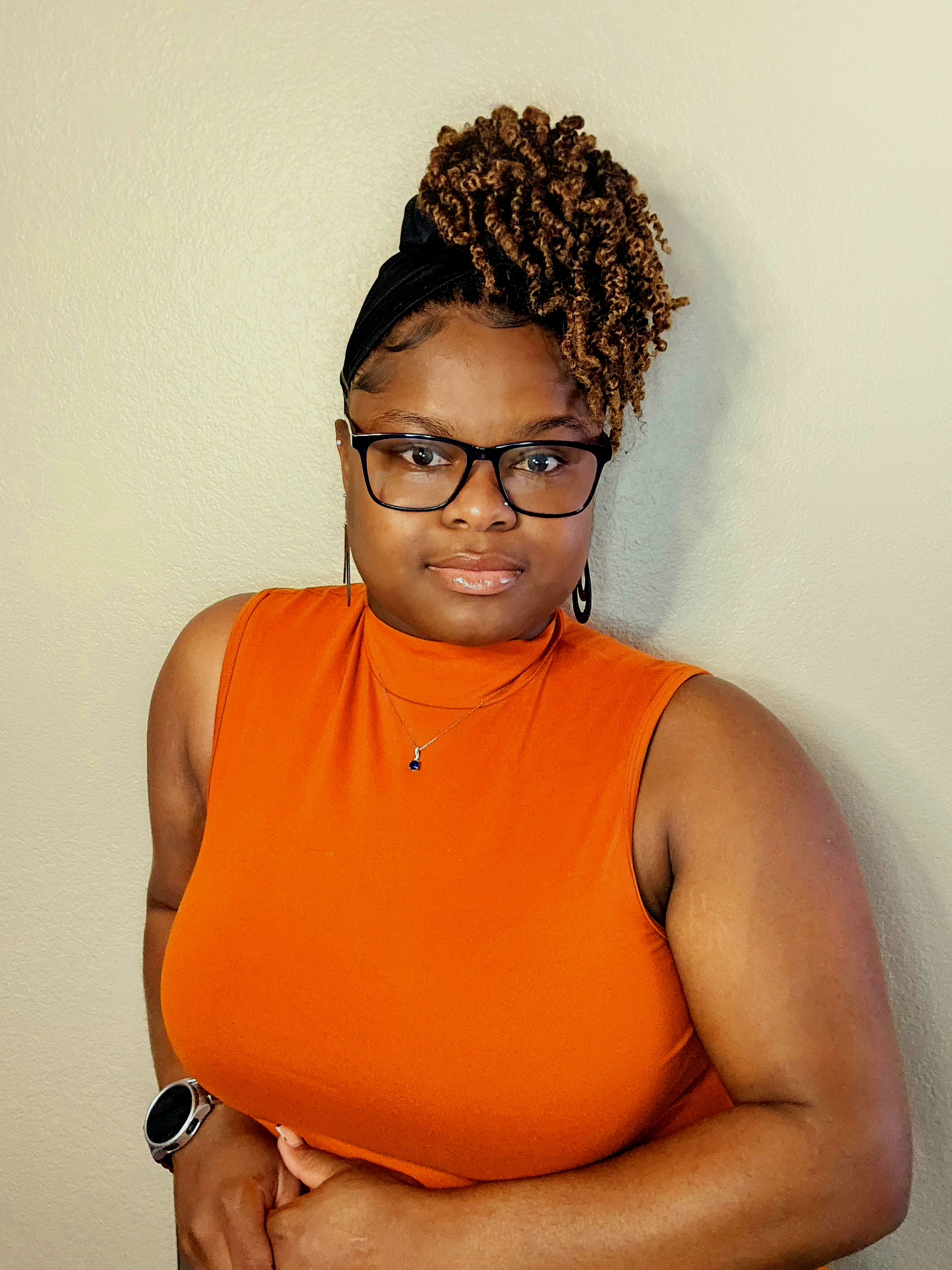
Graduate Student Research Assistant
Tasanya Rowe is a graduate student at Fort Hays State University pursuing her master’s in Clinical Psychology. She aspires to become a Ph.D. clinical psychologist with the goal of conducting psychological testing and research. She holds a deep passion for understanding the intricacies of trauma responses and why individuals exhibit diverse reactions to trauma so she can become a better advocate for those in need. Her overarching goal is to empower survivors of trauma, enabling them to rise above their experiences and not be defined by them, and for them to succeed at pursuing their goals. She is also intrigued by the potential influence of personality traits and potential gender-related variations in trauma responses. Tasanya was born and raised in Jamaica, where mental health and trauma response does not get a lot of attention. Tasanya emigrated to the U.S. eight years ago, for which she is elated for the opportunities she have been given to advocate on behalf of those unable to do so.
Emily Schoeppner
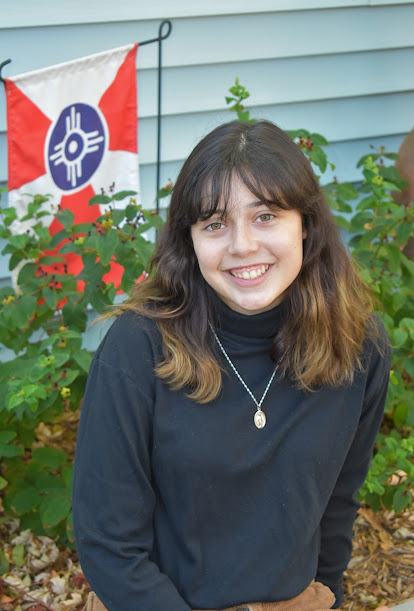
Creative Content Design Intern
Emily Schoeppner is a Fort Hays State University undergraduate student pursuing a degree in Art Education with an emphasis in painting. Emily grew up in Wichita but has come to love the Hays community over the past years. On campus, she is involved in the Honors College and Catholic Tigers, and she has been recognized for her art through the Student Honors Exhibition and John Heinrichs Scholarly and Creative Activities Day (SACAD). Although Emily is new to working with victim advocacy, she is very excited to use her passion for art to represent the stories of resilience.
Former Staff
Megan Shepard
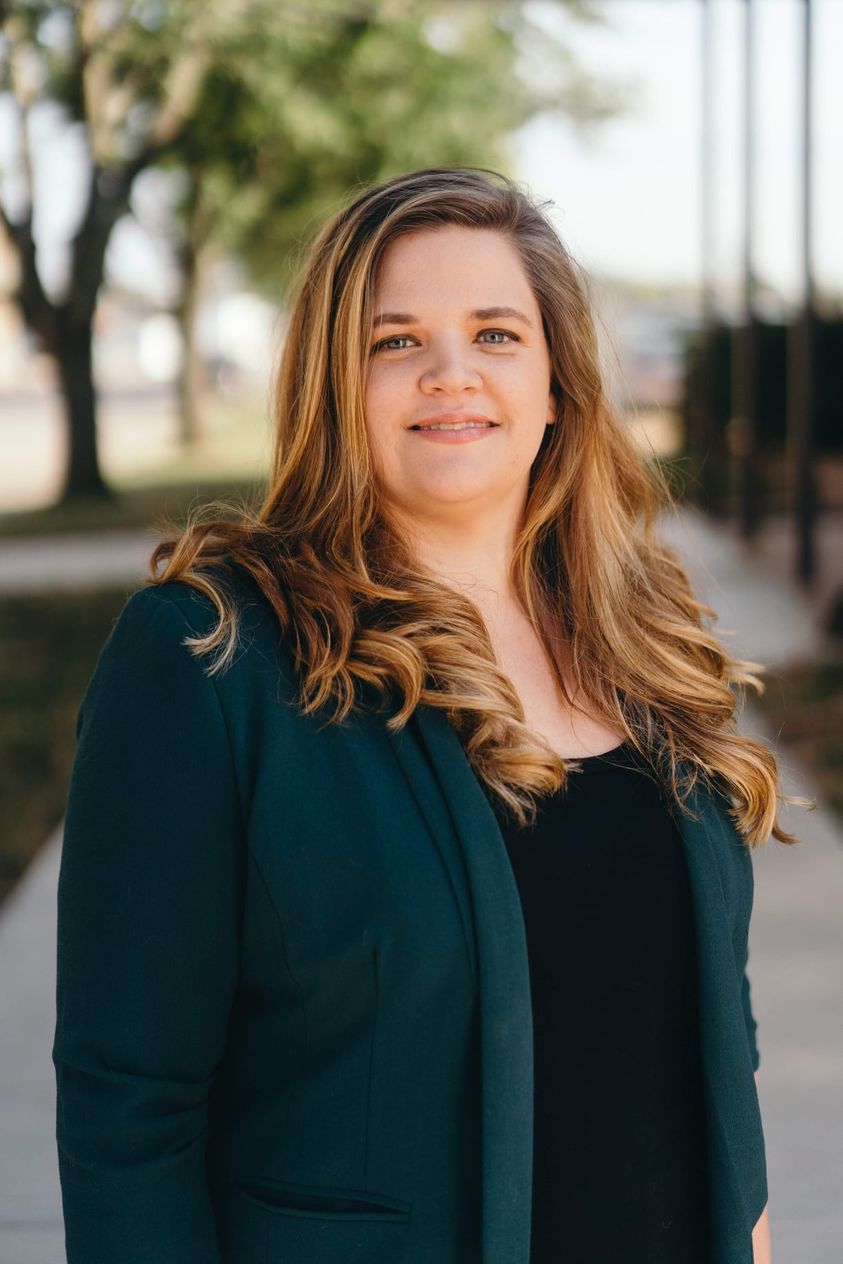
Former Undergraduate Research Assistant and Post Graduate Committee Chair
Megan Shepard received her Bachelor of Science degree in Sociology in May 2023. Megan's previous work includes collaboration with Kansas victim advocacy centers to build a better response to survivors who are incarcerated. Additional partnerships include Just Detention International and the Kansas Department of Corrections to ensure adequate training for corrections staff through the Prison Rape Elimination Act (PREA). She is originally from Kinsley, Kansas but currently resides in Topeka, Kansas, with her partner, four children, three dogs, and three cats. Megan prides herself on advocating for individuals who are often forgotten.
Loganne Ditter

Former Undergraduate Research Assistant
Loganne Ditter received her Bachelor of Science in Psychology in May 2023. Loganne has always had a passion for victim advocacy and is currently working with the center on research regarding economic empowerment for victims of intimate partner violence in rural areas. After graduation, Loganne plans on using the skills she learned as a student researcher to continue her education in social justice issues. While at FHSU, Loganne has been a Peer Academic Leader, a member of Psi Chi, and a participant in the National Student Exchange. Loganne grew up in Hays, Kansas, but currently lives in Orlando, Florida, where she participates in the Disney College Program.
Viviana Lizarraga
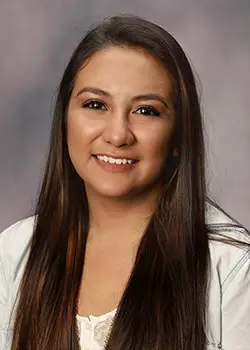
Former Research Assistant
Viviana Lizarraga received her Bachelor of Science in Criminal Justice in May 2019 and her Masters in Psychology in May 2022. Viviana's research background focuses on mental health stigma, gender-based crime, as well as rural crime. She currently works for Larned State Hospital providing competency evaluations.
Garrett McBlair
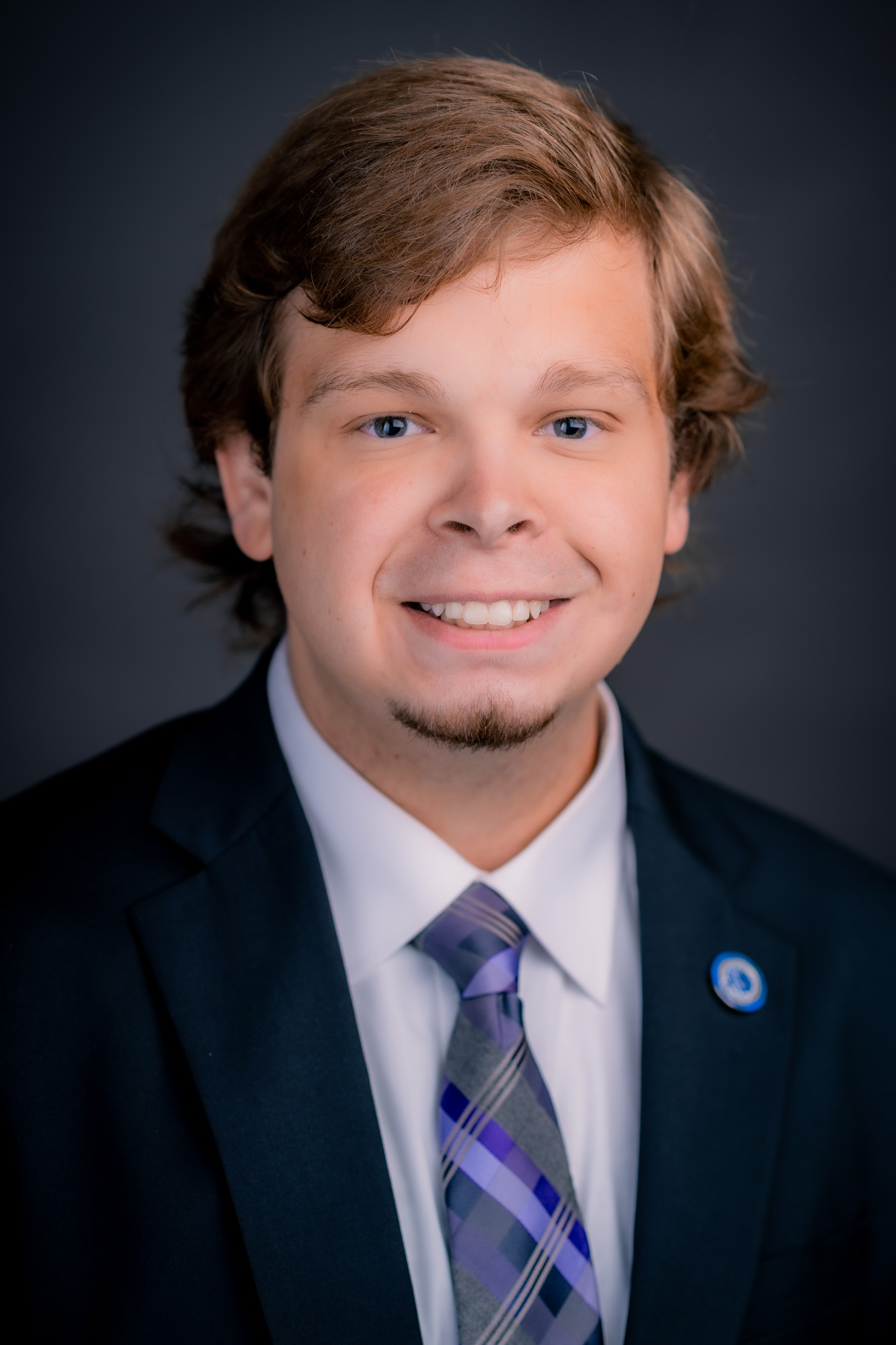
Former Research Assistant
Garrett McBlair received his Bachelor of Science in Criminal Justice in December 2021. As a native of Kansas, he grew up in two towns only ten miles apart, Beloit & Glen Elder, KS. At Fort Hays State University, he was involved with the Sigma Alpha Epsilon fraternity, and served multiple roles, including the president for 3 terms (years). Garrett has been recognized for his service/organizational involvement. He has been named Fort Hays State University's fraternity man of the year, received the "Excellence in Service to Students" award, and was given the Order of The Phoenix (undergraduate achievement award) for his investment and development of his fraternity. He has conducted/assisted with research regarding trauma-informed education in higher education settings and the 2021 Capitol riot/insurrection.
Cristina Jimenez

Former Research Assistant
Cristina Jimenez received her Bachelor of Science in Criminal Justice in May 2023. She was a member of the Fort Hays State University Criminal Justice Club, the Fort Hays Honor Society, and the American Criminal Justice Association. Cristina Jimenez is currently studying Law at the UMKC School of Law in Kansas City, MO.
Brandi Hanson

Former Research Assistant
Brandi Hanson received her Bachelor of Science in Criminal Justice in May 2020. She was a member of the Fort Hays State University Criminal Justice Club, the National Society of Collegiate Scholars, the International Student Exchange, and she served as a Study Abroad Ambassador for the university. Having studied different legal systems worldwide while attending the University of Vigo in Spain, she brought international and cultural perspectives to studying crime in rural communities. Throughout her time at Fort Hays State University, she was on the Dean's Honor Roll six times.
Community Advisory Board
- Anniston Weber is a victim advocate and campus outreach coordinator of the Options Domestic and Sexual Violence Services, Hays, KS
- Becca Stevens is an American author, speaker, and social entrepreneur dedicated to serving vulnerable communities and advocating for social justice. She is the founder and president of Thistle Farms, a nonprofit organization based in Nashville, Tennessee, that provides a safe and supportive community for women who have survived trafficking, prostitution, and addiction
- Cristina Jimenez, former researcher of CEVGV and Criminal Justice alumni of FHSU. She is currently a law school student at UMKC-Law School
- Dr. Christie Brungardt is a renowned expert on relationship violence education and leadership and founded Jana's Campaign, a nonprofit organization dedicated to promoting healthy relationships and preventing Gender-based violence
- Kaley Conner is a prominent mental health professional and advocate at the High Plains Mental Health Center, Hays, KS.
- Loganne Ditter is a Criminology and Criminal Justice graduate student at the University of Nebraska, Omaha
- Megan Shepard is the Policy and Program Oversight Director at the Kansas Department for Aging and Disability Services
- Schuyler Coates is the Director of Development at the FHSU Foundation
- Thomas Powell is the new Robbins Banking Institute director at FHSU and the Board President of the Options Domestic and Sexual Violence Services, a local victim advocacy organization serving Northwestern Kansas
News
CEVGV Newsletter Volume 1, Issue 1
Dr. Rachel Dolechek, research consultant, recently published an article in Business and Professional Communication Quarterly titled "Rebuilding from the Ground Up: Employer and Alumni Perspectives for Course Redesign"
November 14, 2022
The Center for Empowering Victims of Gender-based Violence (CEVGV) was recognized by the 2022 International Society for the Study of Rural Crime (ISSRC) 2022 Policy, Practice, and Engagement Award. The CEVGV, a university-based research and service organization in Criminal Justice Programs, brings together an interdisciplinary team of scholars and students representing multiple colleges across campus.
In 2021, CEVGV was selected as one Rural Innovation site by the Advisory Council of the Rural Justice Collaborative. The RJC showcases the strengths of rural communities and highlights the cross-sector collaboration that is a hallmark of rural justice systems. The work under the RJC is supported by a cross-sector advisory council composed of rural judges along with additional stakeholders in the justice, child welfare, behavioral health, and public health systems.
Congratulations to Megan Shepard, undergraduate student reacher, who will be awarded a certificate and scholarship for her research-based poster in November. Shepard’s poster, titled “Formal and Informal Social Support Matter: Addressing the Needs of Rural Survivors of IPV (Intimate Partner Violence) was announced as the award recipient of the Division of Women & Crime Undergraduate Student Paper and Poster Competition in October. The award and scholarship will be presented to Shepard during the American Society of Criminology annual conference in Atlanta, Georgia, Nov. 18.
November 2, 2022
Past Events
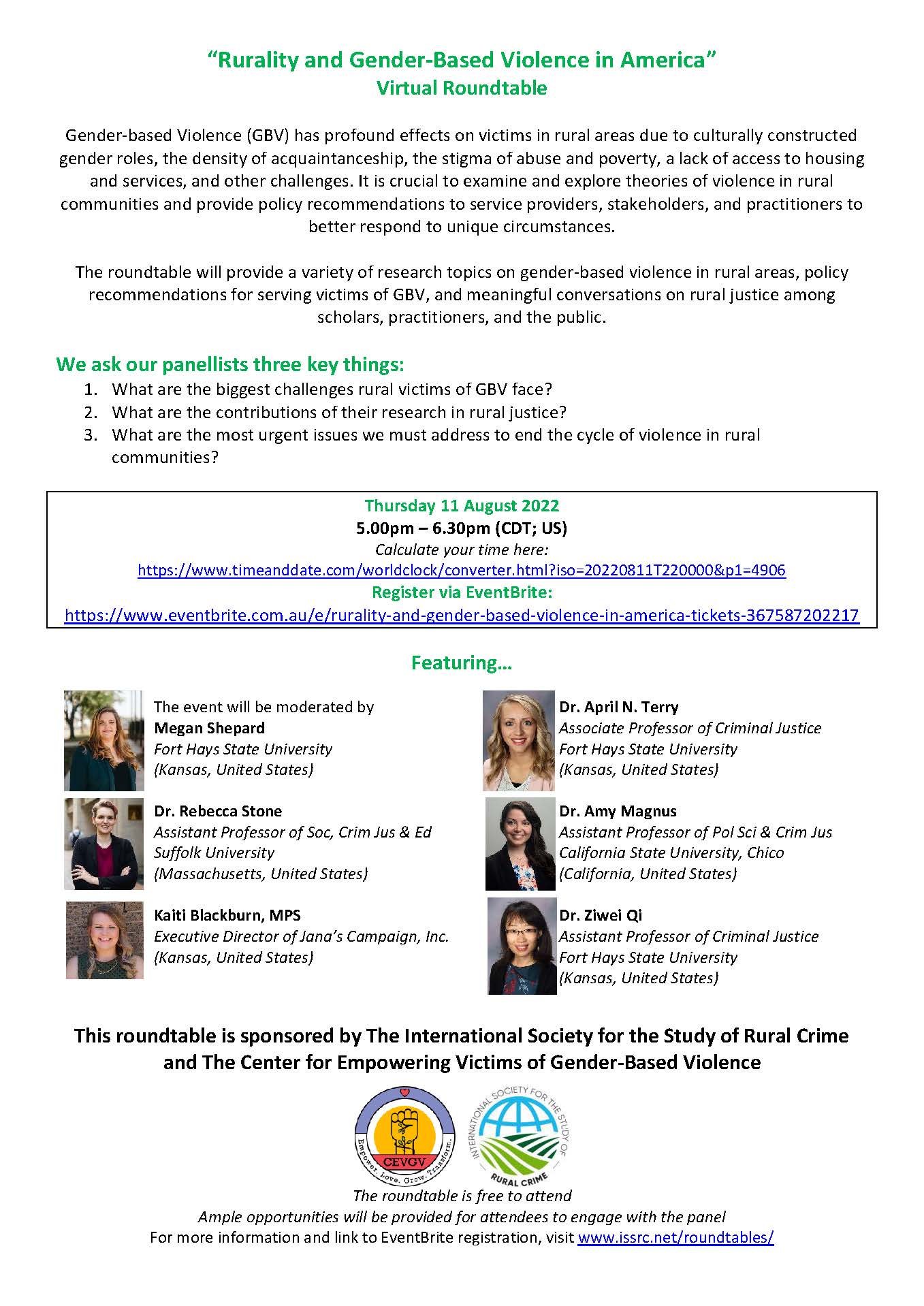
September 29, 2021
"Together We Heal, Together We Rise"

Sponsors: Criminal Justice Program, Center for Empowering Victims of Gender-based Violence (CEVGV), Sociology Programs
Special Thanks to the Provost’s Office, Office of Student Affairs, College of Arts, Humanities, and Social Sciences, Entrepreneurship Faculty Fellowship
Date: September 29th
Time: 10 am to 2 pm (Workshop)
Location: Black and Gold Room at Memorial Union
Please RSVP on EventBrite
Criminal Justice Programs, the Center for Empowering Victims of Gender-based Violence, and Sociology Programs will host an on-campus event in Fall 2021 with the founder and CEO of Thistle Farms-Becca Stevens. Ms. Stevens is a social entrepreneur, social activist, author, motivational speaker, and trauma-informed practitioner. Becca also helped establish ten justice initiatives that have raised more than $55M in funding revolving around trauma, trafficking, addiction, and extreme poverty. Becca was also recognized as a CNN Hero of 2016.
Thistle Farms provides on-site employment and a long-term residential program to women survivors who were justice-involved and victims of sexual violence and human trafficking. Five years after graduation, 75% of Thistle Farms’ graduates are living healthy and financially independent lives.
During her visit to FHSU, Becca will facilitate a workshop on social entrepreneurship, community collaboration, survivor empowerment, and techniques of boosting the local economy. While the workshop is open to all, it is designed for FHSU students who seek victim advocacy and social entrepreneurship certificates. A keynote event will also be open to the public that evening to engage this important conversation with our community.
The workshop aims to support economic independence, counseling, healthcare, and safe housing for the survivors of gender-based violence by sharing information, improving professional networking, assisting with program evaluation, and training that promotes a violence-free community.
The workshop will be open to FHSU students, faculty, and staff, as well as professionals who work with victims of gender-based violence. It is also designed for students who pursue a victim advocacy certificate or social entrepreneurship certificate. Live streaming and recording will also be available for online students.
Time: 7 to 8 pm (Keynote)
Location: Beach/Schmidt
The keynote event is open to the public. It aims to inspire and engage the community to learn about the power of healing, hope, and empowerment for survivors of gender-based violence.
You call also follow us via our Facebook page to watch live and review the recording
September 24, 2021
Roundtable Discussion "Researching Gender in Rural Communities"
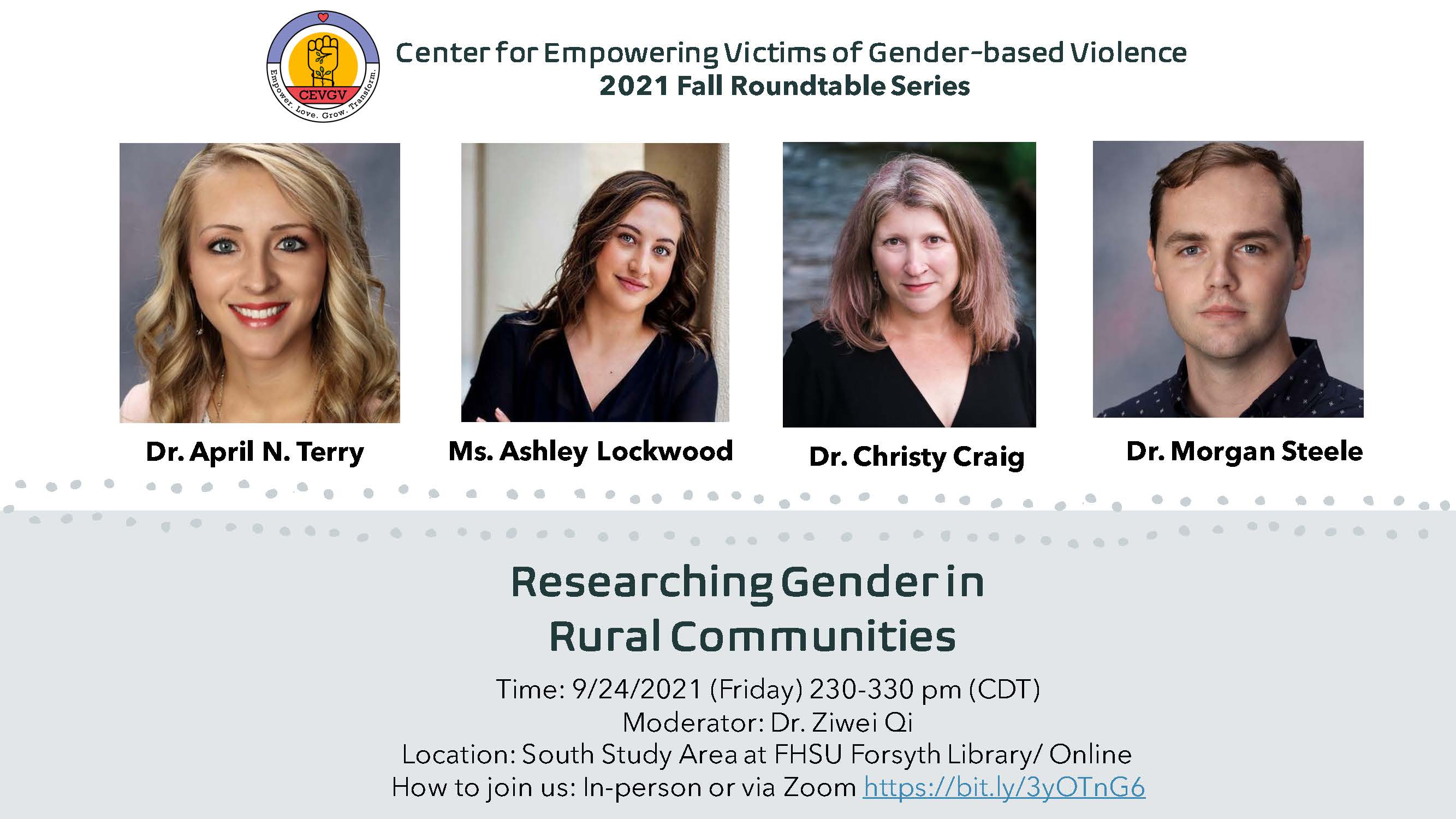
October 29, 2020
"Let's Talk About Domestic Violence"
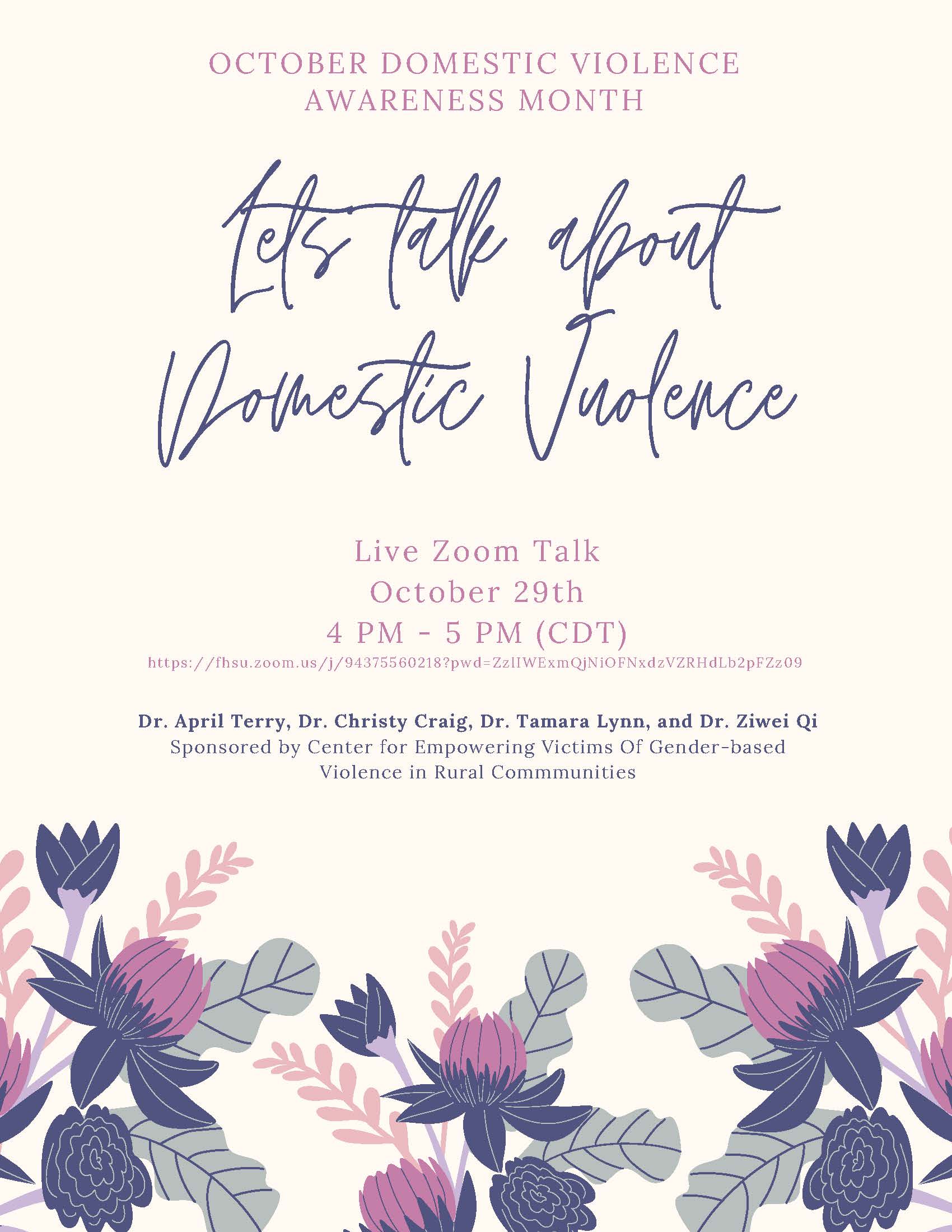
Video Link: https://youtu.be/EjXZ5ZM5F2w
March 16, 2021
"Research and Social Activism on Gender-Based Violence"
Video Link: https://youtu.be/NOArSO9V8kc
April 8, 2021
"Break the Cycle"
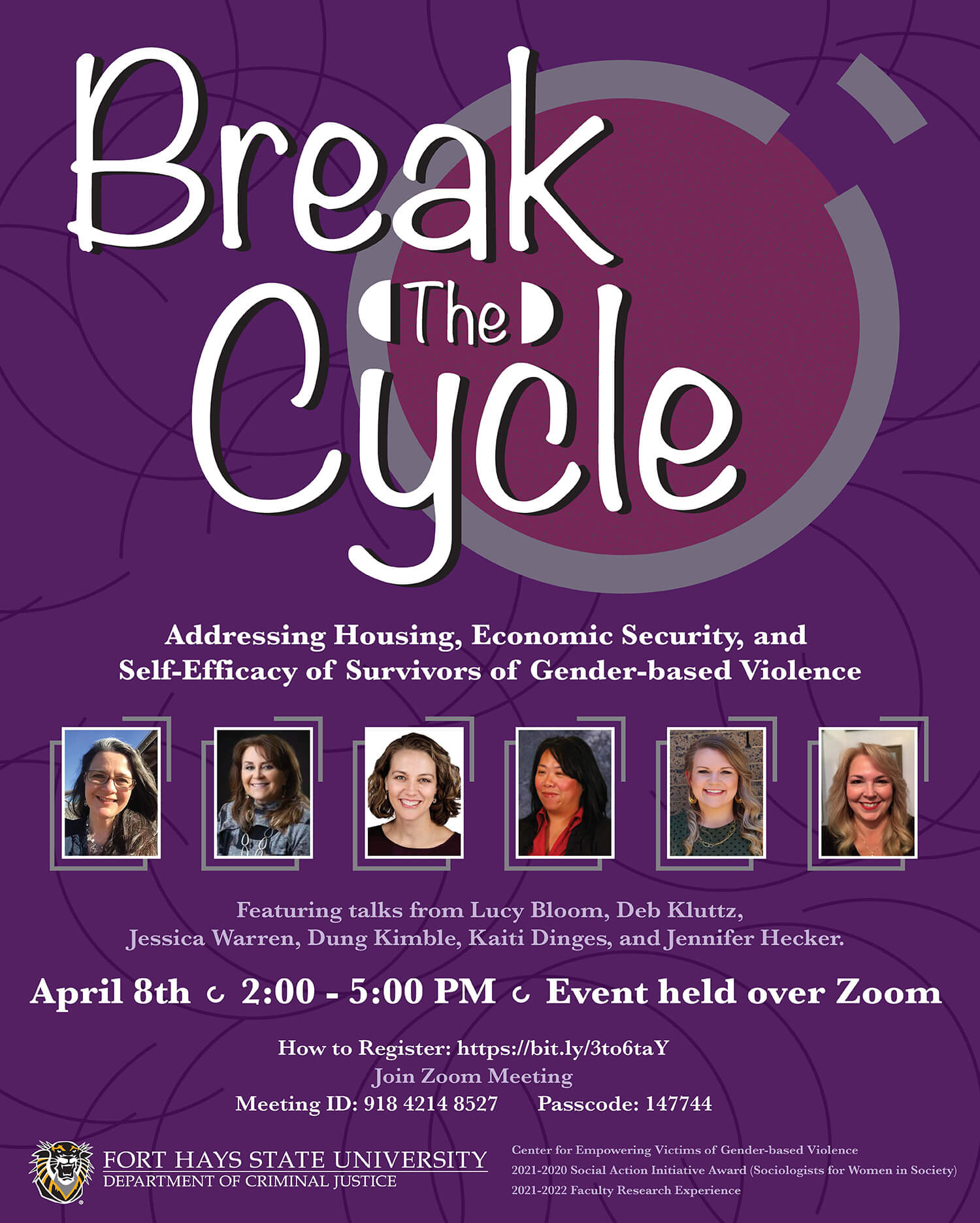
Video Link: https://youtu.be/-Wzq0rcCUs8
April 22, 2021
"Author Meets Critics"
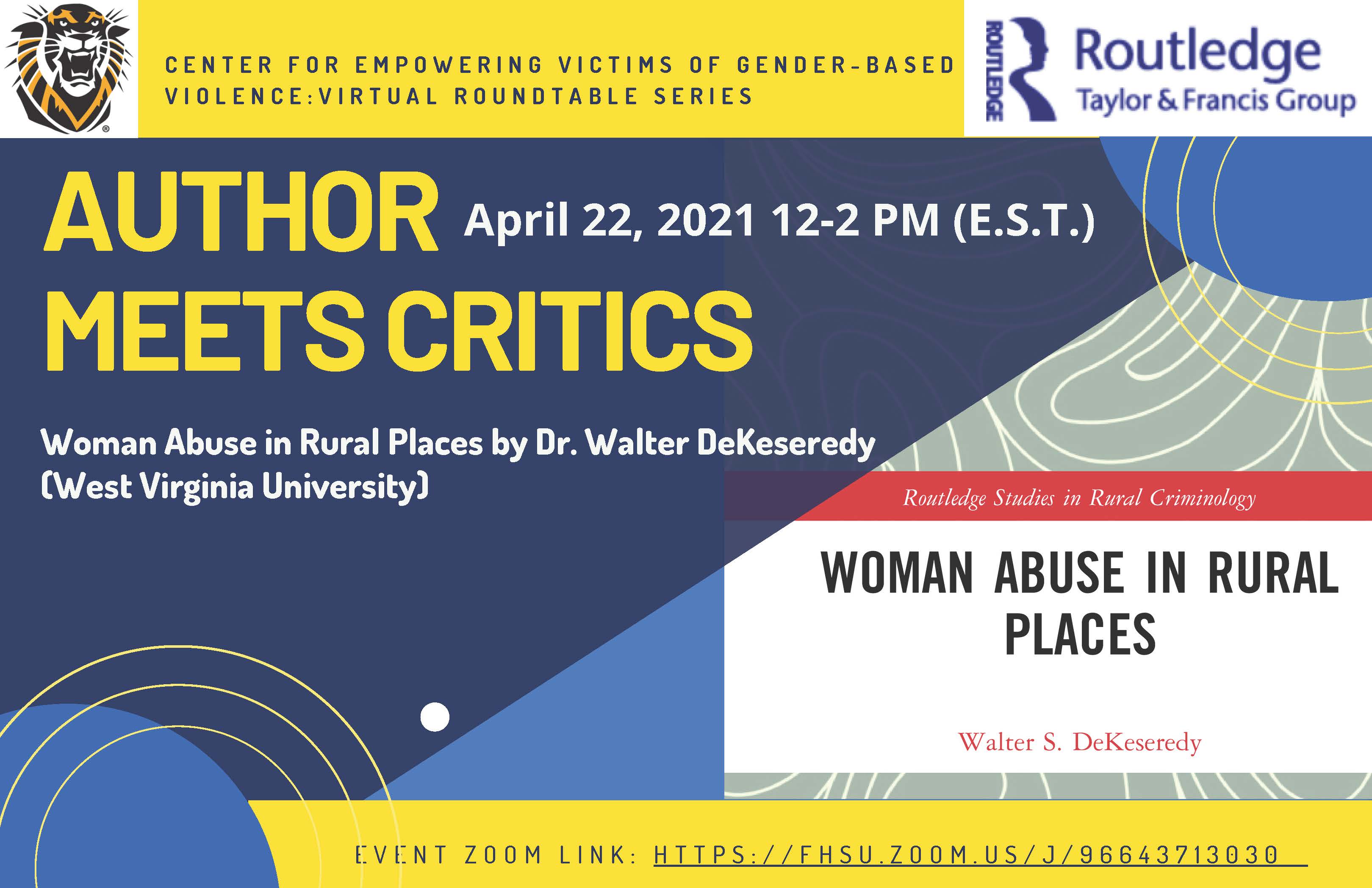
Video Link: https://youtu.be/1_koiDgB5u0
Monthly Roundtable with Dr. Ziwei Qi
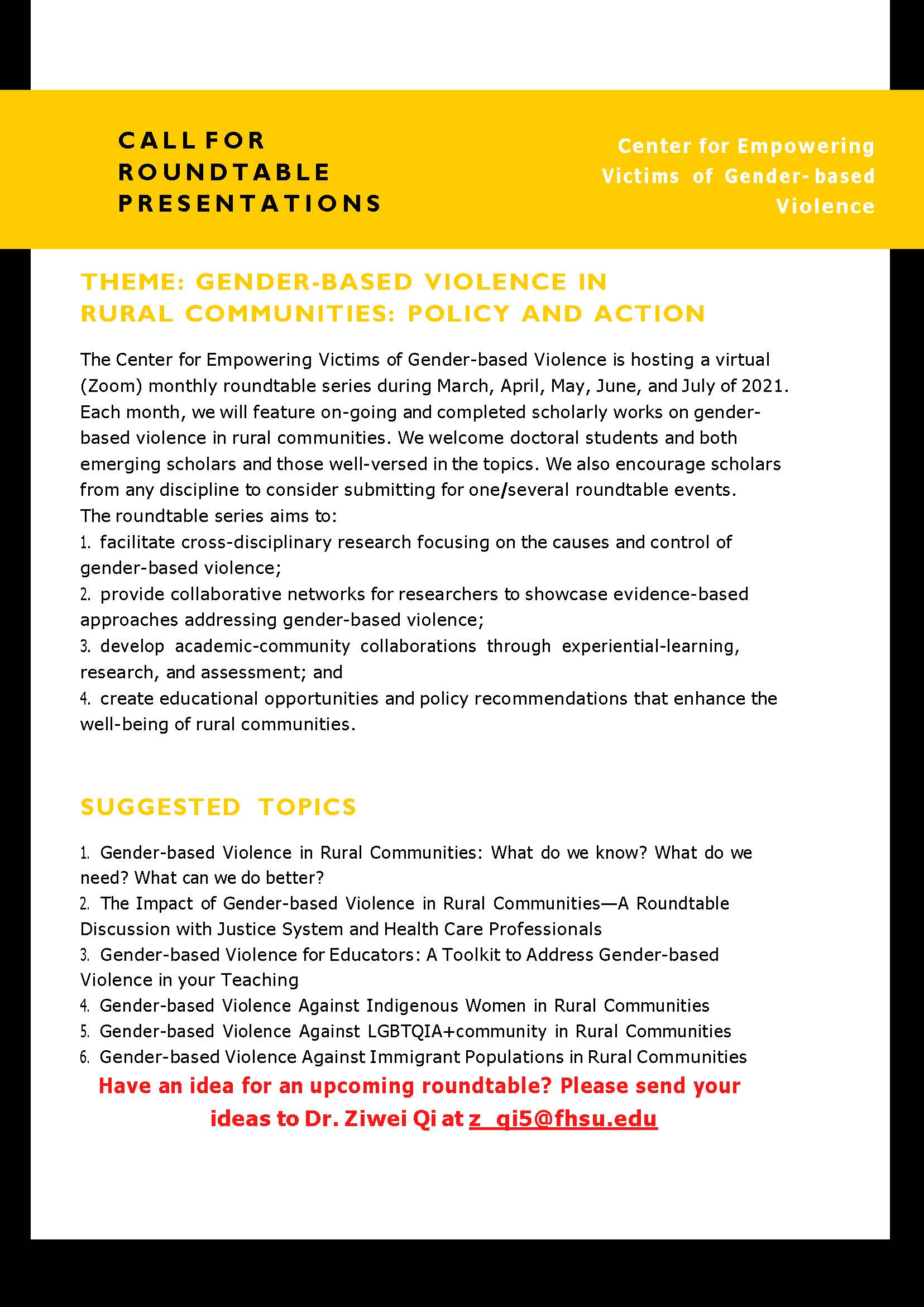
- Priority given to proposals submitted by February 19, 2021
- Please submit proposal to Dr. Ziwei Qi at z_qi5@fhsu.edu
July Roundtable with Dr. April Terry
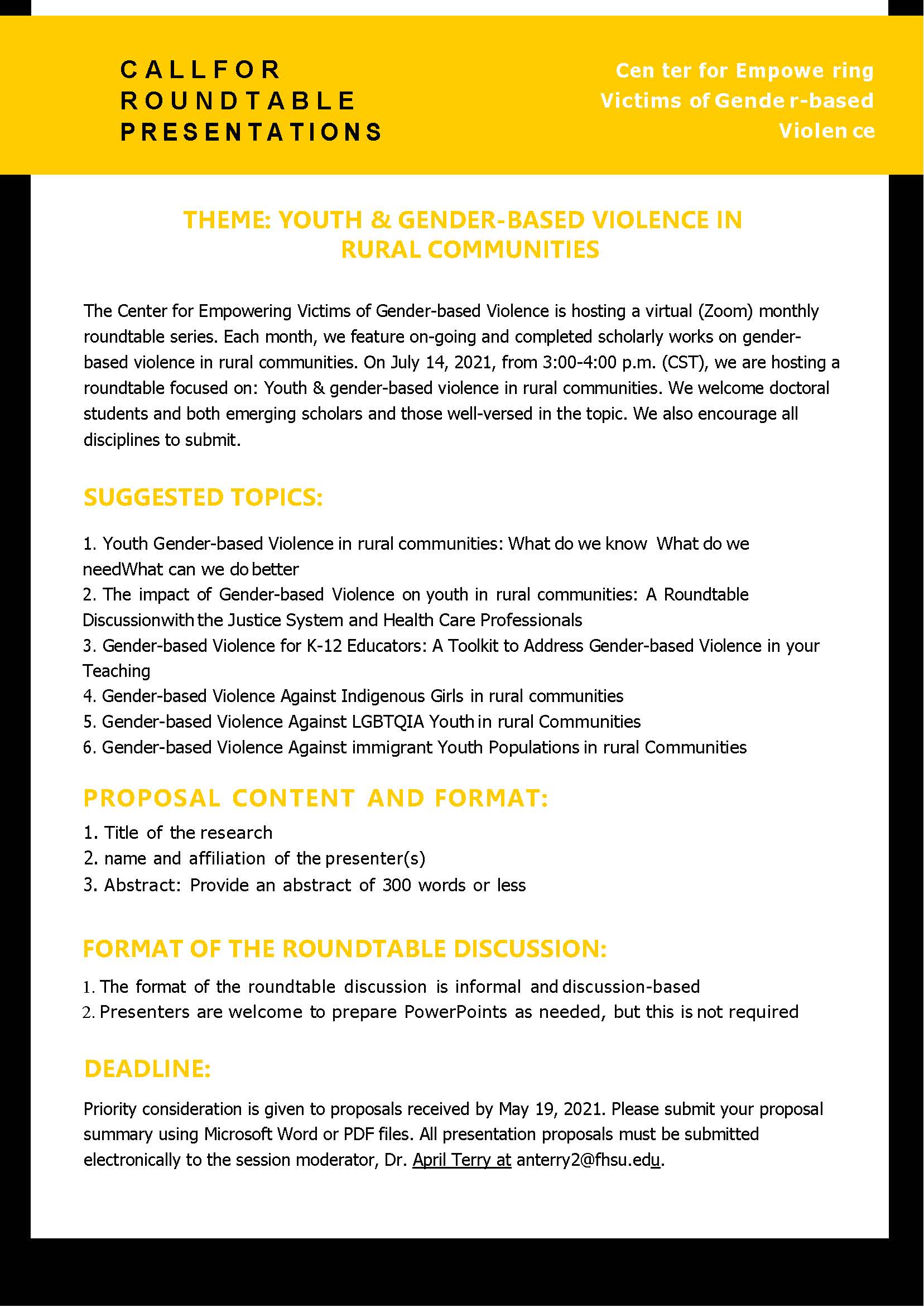
- Priority given to proposals received by May 19, 2021
- Please submit proposal to Dr. April Terry at anterry2@fhsu.edu
